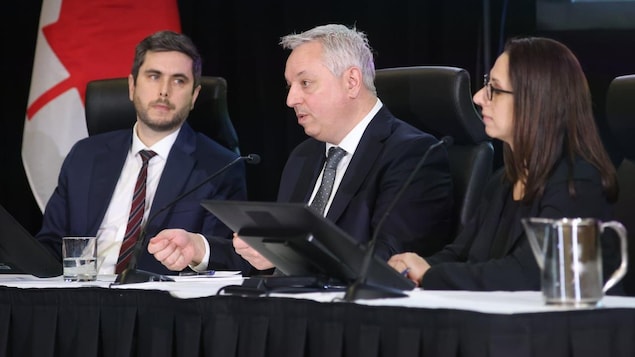- Home
- Politics
- Federal Politics
Canada a ’high-priority' target for Chinese interference, CSIS doc tells Hogue inquiry
In its first phase, the inquiry is trying to define the limits of official secrecy

Dan Rogers, deputy national security and intelligence adviser, Privy Council Office (left), David Vigneault, director of the Canadian Security Intelligence Agency, and Alia Tayyeb, deputy chief of signals intelligence, Communications Security Establishment Canada, appear at the Public Inquiry into Foreign Interference in Federal Electoral Processes and Democratic Institutions hearings in Ottawa on Thursday, Feb. 1, 2024.
Photo: The Canadian Press / Patrick Doyle
Catharine Tunney (new window) · CBC News
Canada was considered a high-priority
target for Chinese interference ahead of the 2021 election, according to a top-secret intelligence assessment viewed by the Hogue commission inquiry on Thursday.
The inquiry is investigating whether Beijing, Russia, India and other nations interfered in the past two elections, and how information about foreign interference flowed within the federal government. Commissioner Marie-Josée Hogue was chosen to lead the inquiry after media reports accused the People's Republic of China of meddling in the 2019 and 2021 federal elections.
PRC [foreign interference] activity targeting Canada's democratic institutions is primarily motivated by a desire to cultivate relationships with or support political candidates and incumbents who seem receptive or actively promote PRC viewpoints,
says the July 2021 threat assessment by the Canadian Security Intelligence Service.
Canada is a high-priority PRC FI target and the party intends to use Canada and Canadians to proactively support PRC interests.
- Uyghur group withdraws from foreign interference inquiry, says victims won't be protected (new window)
- The foreign interference inquiry begins with one big question — how much must it keep secret? (new window)
While chunks of the nine-page document were redacted, most of it was readable. Other documents shared with the inquiry, including one about China's tactics, have been entirely redacted.
CSIS Director David Vigneault was questioned Thursday about CSIS's reasons for redacting some documents and not others.
During this week's preliminary hearings, the commission is wrestling with the question of how to conduct a public inquiry when most of its documentary evidence includes sensitive or secret government information.
Another document shared with the commission was entirely blacked-out by redactions. Vigneault suggested it dealt with raw intelligence — some of the most closely-held information in CSIS.
In other contexts, it's possible that [by] referencing something that may not be classified, because it's related to China Chinese intelligence services would be able to make deduction and be able to make analysis of what we know, what we're interested in,
he said. And that this is the the root of why we are protecting information.
CSIS's 'purpose' is secrets: Vigneault
The questions Vigneault faced Thursday morning did not delve into the contents of the CSIS documents but instead focused on why and how some information is redacted, while other details are simply removed.
Vigneault said CSIS has agreed to a tailored
procedure to share documents and will have a specialized unit in place to decide what can be shared openly with the inquiry.
The intent we bring to the commission is to be able to be as transparent as possible within the limitations that exist,
he said, adding that the purpose of CSIS is to have secrets.
WATCH: CSIS director defends agency's approach to secrecy
Alia Tayyeb, deputy chief of signals intelligence at the Communications Security Establishment, said her agency has a similar setup in place for the commission.
This is not the normal procedure,
she said.
On Thursday, the commission dealt with 13 documents that were redacted to one degree or another. Vigneault said that work took 200 people hours to complete.
Experts reviewed each and every line,
he said. It's a very significant amount of resources.
The discussions this week on national security are meant to set the stage for the next round of public hearings, scheduled for March.
Those hearings are intended to investigate allegations of foreign interference by China, India, Russia and others in the 2019 and 2021 federal elections. The inquiry's interim report is due May 3.
ABOUT THE AUTHOR
Catharine Tunney (new window) · CBC News · Reporter
Catharine Tunney is a reporter with CBC's Parliament Hill bureau, where she covers national security and the RCMP. She worked previously for CBC in Nova Scotia. You can reach her at catharine.tunney@cbc.ca




